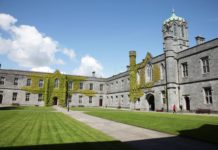The aims of the Easter Rising are something to commemorate with honour and defend from its detractors, writes veteran socialist activist Sean Garland.
T’was England bade our wild geese go
That small nations might be Free
But their lonely graves
Are by Suvla’s waves
Or the fringe of the great North Sea
The foregoing lines from the ballad, ‘The Foggy Dew’, written shortly after the Easter Rising, remind us that Ireland at the time of the World War I and at Easter 1916 was a small unfree country. Those who today wish to distort and deny the aims and principles of the 1916 Proclamation have never accepted the right of the Irish people to be free and independent. More and more of those who wish to smear the men and women of the Easter Rising of 1916 are coming out to declare their allegiance to a foreign power and as we know from our history there has never been any shortage of such people.
On one side those who stood for privilege and foreign government and on the other side those of Irish and British stock who stood for an Irish Nation Democratic and Independent.
The modern-day apologists for British rule in Ireland are well known; Kevin Myers, Ruth Dudley Edwards, lately joined by other voices, and of course we have the usual flock of clergy lining up to give us their opinions which as usual tell us all those who sought Irish freedom were wrong. They go back to the days of the United Irishmen and women whom they hate and they do their best to destroy the memory and ideals of 1798. As Rosemund Jacob states in her book ‘The Rise of the United Irishmen’, “On one side those who stood for privilege and foreign government and on the other side those of Irish and British stock who stood for an Irish Nation Democratic and Independent.” This is still the situation today.
The cry from all these, and of former Taoiseach John Bruton, that the Easter Rising was anti-democratic and immoral really is the last straw when we recollect how Irish Parliamentary Party leader John Redmond, whom all of the above admire and quote extensively, did nothing during that period but to call on Irishmen to join the British Army and go to fight the German Army in Europe. Tens of thousands of Irishmen, North and South, answered Redmond’s call and tens of thousands died because of his call. Alongside being a Recruiting Sergeant for the British Army, in his task of serving Britain in this war, Redmond succeeded in splitting the Irish Volunteers.
Bruton has even made the incredible claim that “Independence was won in Principle in 1914”. You must ask is this man for real with such a ludicrous remark. The Home Rule Bill passed by the British House of Commons did not guarantee a free independent Irish Republic which was the objective endorsed by the Irish people in the 1918 General Election. What was envisaged by the British was a client state and this fact was borne out by the Treaty of 1922. Bruton even condemned the decision of the Government to have the National Army distribute the National Flag and a copy of the 1916 Easter Rising Proclamation to all schools in the country.
Of course such attacks have a long pedigree. We cannot commemorate the Rising without recalling the treachery and hatred that the then Irish Independent owner William Martin Murphy demonstrated against the men and women of Easter week. His hostility and hatred towards ITGWU members during the Lockout of 1913 had already shown his true nature – one that in 1916 led him to use his newspaper empire to attack the aims and ideals of the Easter proclamation and call on the British Government not to stop the executions of the Rising leaders but to insist that no leader should be spared, most especially the wounded James Connolly.
In commemorating the Rising, we should pay tribute to the anti-colonialist Roger Casement who contributed to the preparations for Easter 1916 and was hanged in August 1916 by a vindictive British government.
This international aspect of the Rising is key: it was a not just for Ireland but against the British Empire
This international aspect of the impact of the Rising is key: it was a blow not just for Ireland, but against the British Empire that held millions in oppression across the globe. James Connolly saw it as his duty to support the struggles of workers in every part of the world. This viewpoint was encapsulated in his slogan “The workers of all nations are my natural allies as the native capitalist is my natural enemy.”
But also we should remember the progressive views of Padraic Pearse, who wrote “ [Wolfe] Tone had appealed to that numerous and respectable class, “the men of no property and in that gallant and characteristic phrase he had revealed his perception of a great historic truth, namely, that, in Ireland “the gentry” (as they affect to call themselves) have uniformly been corrupted by England, and the merchants and middle class capitalists, have, when not corrupted, been uniformly intimidated, whereas the common people have for the most part remained unbought and unterrified… Let no man be mistaken as to who will be lord in Ireland when Ireland is free. The people will be lord and master.”
Whatever the manifest failings of the current Republic of Ireland, these should not be be allowed to cloud the memory of the leaders of the Rising.





